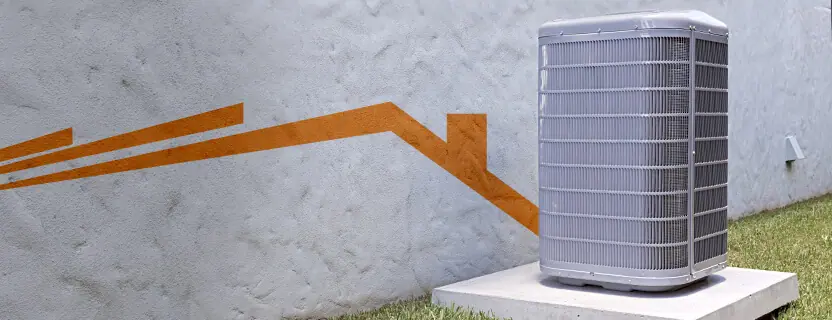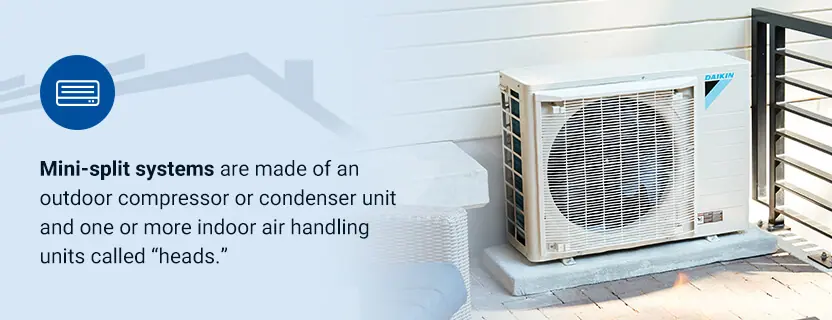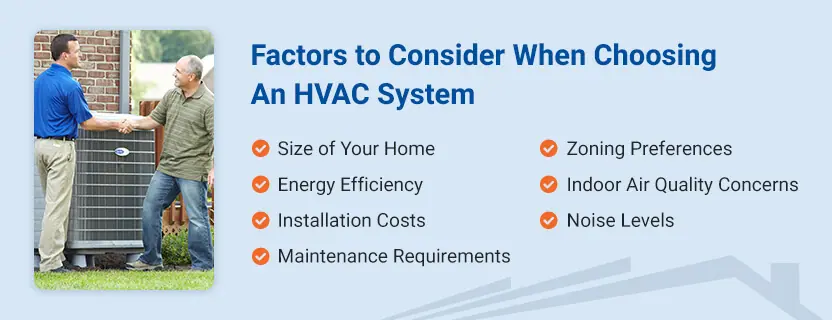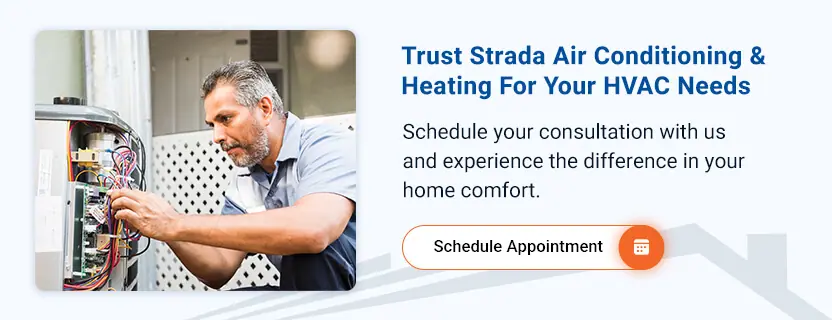
A reliable and efficient HVAC system is essential for maintaining a comfortable home. However, with so many different types of HVAC systems available, it can be overwhelming to determine which one best suits your needs.
Whether you’re building a new home, replacing an old HVAC unit or upgrading your current system, understanding the most common types of HVAC systems and their features is crucial in making an informed decision.
In this comprehensive guide, we’ll explore the various types of HVAC systems, including ducted and ductless options and discuss their pros and cons.
HVAC is an acronym that stands for heating, ventilation and air conditioning. It refers to the various systems used for moving air between indoor and outdoor areas, along with heating and cooling residential and commercial buildings. The primary goal of an HVAC system is to provide thermal comfort and maintain good indoor air quality.
A typical HVAC system includes several components that work together to control:
HVAC systems can include various equipment, such as central air conditioners, heat pumps, furnaces, boilers and ductless mini-splits. The specific components needed depend on factors like the size of the building, the number of rooms, the local climate and the particular needs of the occupants.
There are two main types of HVAC systems — ducted and ductless. Let’s explore the examples of each.
Ducted HVAC systems use a network of ducts to distribute conditioned air throughout the house. The main components of a ducted system include an outdoor unit, an indoor unit and a system of ducts that carry the conditioned air to various rooms in the home.
Split systems, also known as forced air systems, are made of an outdoor unit that houses the condenser and compressor and an indoor unit, which includes the air handler and evaporator coil. The term “split” refers to the fact that some components are located inside the home while others are outside.
Split systems have several benefits, including:
The cons of split systems are the following:
A hybrid split system, also known as a dual-fuel system, combines a gas furnace with an electrical heat pump. Depending on weather conditions and energy costs, you can switch between electricity and gas to heat your home with this system. The heat pump is used for cooling and mild heating, while the gas furnace kicks in during colder temperatures to provide more powerful heating.
The pros of hybrid split systems are the following:
Hybrid systems also have several disadvantages, including:
A zoned HVAC system allows you to independently control the temperature in different areas or “zones” of your home. Zoned HVAC systems use dampers within the ductwork that selectively block or allow airflow to a specific zone. Each zone has its own thermostat, enabling you to customize the temperature settings according to your preferences and occupancy.
The advantages of zoned HVAC systems are the following:
Zoned HVAC systems have several disadvantages, including:
Ductless HVAC systems do not rely on air ducts to distribute conditioned air throughout the home. Instead, they typically comprise of an outdoor condenser or compressor unit connected directly to one or more indoor air handling units set up on walls or ceilings.

Mini-split systems are made of an outdoor compressor or condenser unit and one or more indoor air handling units called “heads.” Power cables, refrigerant tubing and a condensate drain line connect the indoor and outdoor units through a small hole in an exterior wall by power cables.
The following are the pros of duct-free mini-splits:
The cons of ductless mini-splits include:
Window air conditioners are self-contained units that cool a single room or a small area. They are typically installed in a window or through a hole in an exterior wall. They contain all necessary components, including the compressor, condenser, evaporator and air handler, in one compact box.
The pros of window AC units are:
Some cons of window AC units include:
Portable air conditioners are freestanding units that can be moved from room to room. They work similarly to window units but sit on the floor. A flexible exhaust hose is connected to the unit and vented out through a window to remove hot air and moisture from a room.
The advantages of portable AC units include:
The disadvantages of portable AC units include:
Heat pumps are versatile HVAC systems that can heat and cool your home. They transfer heat from one place to another rather than generating heat like furnaces do. Heat pumps remove heat from your home and expel it outside in summer, while in winter, they extract heat from the outdoor air and bring it inside.
You can have a portable or permanent heat pump. Portable heat pumps are freestanding, allowing you to move them from room to room as needed. Permanent heat pumps can be single-zone or multi-zone. Single-zone heat pumps are made of one outdoor unit connected to a single outdoor unit, while multi-zone ones have one outdoor unit connected to multiple indoor air handling units.
Heat pumps have several benefits, including:
There are several drawbacks of heat pumps, including:
Hydronic heating systems are a type of radiant heating that uses hot water to distribute heat throughout the home. These systems typically comprise a boiler, pipes, radiators and radiant floor systems. The boiler heats water, which is circulated through a series of pipes to radiators, baseboards, or radiant floor systems in each room.
There are several pros of hydronic HVAC systems, including:
The cons of hydronic heating systems include:

When selecting the best HVAC system for your home, consider the following factors:
The square footage of your home will determine the capacity of the HVAC system needed to heat and cool your space efficiently. An HVAC professional can help you calculate the appropriate size based on factors such as ceiling height, insulation, window size and placement and local climate.
To save energy costs, look for HVAC systems with high Seasonal Energy Efficiency Ratio (SEER ) and Heating Seasonal Performance Factor (HSPF) ratings. Higher ratings indicate better energy efficiency, resulting in lower utility bills and reduced environmental impact.
Consider the upfront costs of installing different types of HVAC systems, including any necessary ductwork or electrical upgrades. While some systems may have a higher initial cost, they may offer long-term energy savings that can offset the investment over time.
Some HVAC systems require frequent maintenance, which can impact long-term costs and convenience. Consider each system’s maintenance needs and choose one that aligns with your availability and budget for ongoing care.
If you want to control temperatures in different areas of your home independently, consider a zoned system or ductless mini-splits. These options allow you to customize your comfort levels based on room usage and occupant preferences.
If you or your family members have allergies or respiratory issues, look for HVAC systems with advanced filtration options. Some systems offer built-in air purification features or can be paired with standalone air cleaners to improve indoor air quality.
Consider the noise levels of different HVAC systems, particularly if you have bedrooms or other quiet areas in your home. Some systems, like ductless mini-splits, are known for their quiet operation, while others may produce more noticeable sound.
To help you choose the best HVAC system for your home, we’ve answered some of the most common questions on HVAC systems:
The best HVAC system for your home depends on many factors, such as your climate, home size, energy efficiency preference and budget. A professional HVAC contractor can assess your needs and recommend the most suitable system.
HVAC stands for heating, ventilation and air conditioning. It encompasses all components of indoor comfort control, including heating and cooling. AC refers specifically to the cooling aspect of an HVAC system.
The ideal size of your HVAC system will depend on your home’s square footage, insulation, window placement, and other factors that impact heating and cooling load. An HVAC professional can calculate load to determine the appropriate system size for your home.
The cost of installing a new central AC system varies based on your home size, the type of system you choose and local labor rates.
The life span of an HVAC system varies depending on the type of system, brand and maintenance. On average, air conditioners and heat pumps last 10 to 15 years, while furnaces can last 15 to 20 years. Regular maintenance and timely repairs can help extend the life of your system.
Have a professional service your HVAC system at least once a year, typically before the start of summer or winter. Regular maintenance can help improve system efficiency, prevent breakdowns and extend the life of your equipment.
Selecting the right HVAC system is one part of the equation. Choosing a reputable, experienced HVAC contractor to install and maintain your system is equally important. A skilled contractor will:
Now that you understand the different types of HVAC systems available, it’s time to take the next step toward a more comfortable and energy-efficient home. Contact Strada Air Conditioning & Heating today to schedule a free in-home consultation. Our experts will assess your unique needs, recommend the best solution for your home and budget and provide expert installation and maintenance services to keep your system running smoothly for years to come.
Don’t wait — schedule your consultation with Strada today and experience the difference that a trusted, professional HVAC contractor can make in your home comfort.
